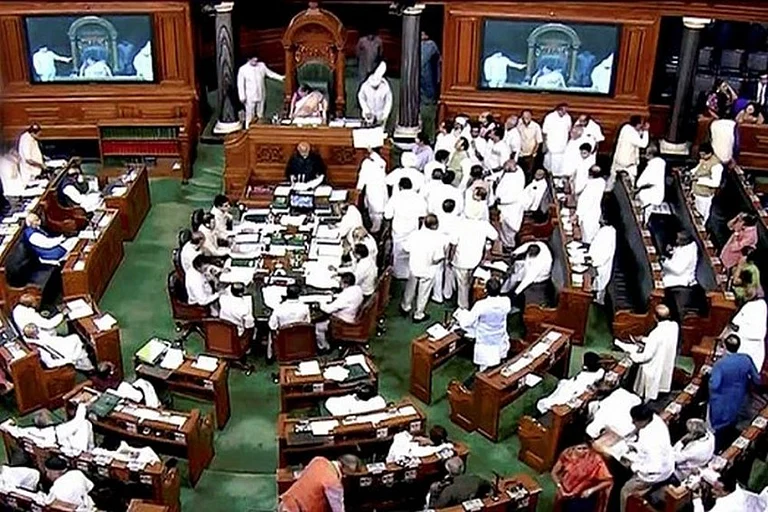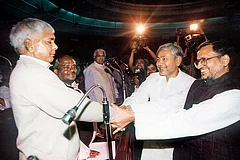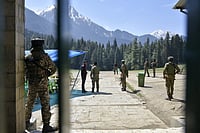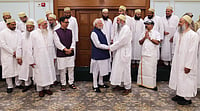It was an affair that was meant to happen. Just that it took Vishal Patil a little over 30 years to finally win over the love of his life—the Congress. On June 6, two days after winning the Sangli Lok Sabha constituency with a margin of over one lakh votes, he headed straight to 10 Janpath, his face pink with the celebratory gulal. Minutes later, he announced his official engagement with the Congress by sharing his photo on X, flanked by Rahul and Sonia Gandhi, and he captioned it Hum Saath Saath Hai.
Patil defeated the BJP’s incumbent MP Sanjaykaka Patil as an independent candidate but later pledged his unconditional support to the Congress. The endorsement helped the party to take its overall winning tally in the Lok Sabha to 100—for the first time since 2014—and enabled Patil’s long-awaited return to the party’s fold as a Congressman.
The Congress ideology runs deep in Patil and his family. His grandfather, the late Vasantdada Patil, was a stalwart leader and two-time chief minister of Maharashtra. His father Prakash Patil was an MP and his brother Pratik Patil is the former Minister of State for coal.
“My family is bound to Congress’ ideology. We are like ek duje ke liye,” Patil says. The song from the 1981 hit movie of the same name featured in every campaign rally of Patil. It was his way to publicly declare his intense dedication to the Congress, a party that rejected his proposal for official candidature on four occasions in the last 30 years.
At 18, he was told he was too young to contest the Zilla Parishad elections. In his 20s, he was not ready to be fielded on a Congress ticket for the Maharashtra Assembly and by the time he was in his 30s, disagreements within the Congress became a hurdle for the Lok Sabha ticket.
In 2019, upon the Congress’s suggestion, he contested the Sangli seat on the ticket of alliance member Shetkari Swabhimani Sanghatna but faced defeat. Patil did not lose heart and continued to build his network and connect with the people at the grassroots level. “We were not prepared for the 2019 election. There were quarrels within the Congress cadre and the division of OBC votes eventually helped the BJP to win. But this time, we had corrected our past mistakes. I was confident of my win,” he says.
The Sangli seat was the highly contested one, putting the Mahavikas Aghadi parties at loggerheads. Both the Congress and the Shiv Sena (Uddhav Balasaheb Thackeray) had differences over ticket distribution and both refused to withdraw their candidature. “The Congress wanted to back Patil as the official candidate of the MVA, but the UBT faction was not willing to back down. As part of the coalition, we let them keep the official candidate and told Patil to contest independently,” says a Congress worker.
Patil, who filed his nomination as an independent candidate, refused to withdraw it even as it caused turmoil within the MVA coalition. He could have faced expulsion for rebelling against the coalition member. However, he decided to face the two heavyweights—BJP’s Sanjay Patil and Sena UBT’s Chandrahar Patil. “My rebellion was not out of selfish reasons, but was important for a larger social cause, for the Congress party’s existence and relevance in Sangli,” Patil says.
Sangli used to be a stronghold of the Congress, but since 2014, the BJP has been dominant at the assembly and parliamentary levels. Patil said coming back to power was the only way to reinstate the Congress’s influence in Western Maharashtra’s sugar belt. He is confident that the party will make positive gains from Sangli in the upcoming Assembly polls.
As an MP, he intends to procure central funds for farm irrigation projects, lobby with the Union government to expand the quota ceiling in Maharashtra, resolve the reservation agitation of Maratha and Dhangar communities and make Sangli a smart city.
MORE FROM THIS ISSUE
Although successive generations of the Patil family have fought on Congress ticket, Patil denied he was the product of dynastic politics. “People will not vote for me if they don’t find me a worthy candidate, but to say because I belong to a political family and therefore should not contest elections, is unfair. I am not just banking on my family’s legacy but on the merit of my work.”
(This appeared in the print as 'Rebel With A Cause')


































